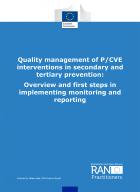Details
- Publication date
- 23 December 2021
- Author
- Directorate-General for Migration and Home Affairs
- RAN Publications Topic
- Evaluation
Description
In recent years, the measures for preventing and countering violent extremism (P/CVE) have undergone innovation, differentiation and professionalisation. Particularly in secondary and tertiary prevention, such developments have been linked to temporary funding of short-term or pilot projects.
Many new approaches are developed and tested in these projects, but the practitioners implementing them are under constant pressure to report quick results (‘to deliver’), move on to the next approach or repackage measures to obtain further funding.
Under these circumstances, knowledge transfer across projects poses a challenge. But increasingly, the call for evaluating, learning and monitoring measures of secondary and tertiary prevention is being heard and fulfilled, not least within the Radicalisation Awareness Network (RAN). And this is critical, as all stakeholders in P/CVE measures have an interest in assessing progress in the implementation of measures and the achievement of intended results.
However, evaluations and internal learning efforts will be limited if the necessary data cannot be obtained and if there is inadequate internal coordination and knowledge management. While evaluations may aim at improving internal quality management processes of P/CVE measures, they are simultaneously contingent on the prior implementation of quality management strategies.
Yet there has been little discussion to date on how to actually build that foundation: this brief RAN paper seeks to stimulate this debate and systematise some of the key facets of quality management in the context of secondary and tertiary prevention measures. By analysing and breaking down quality management in various processes, tools and methods, the paper provides practitioners with starting points for its implementation in related monitoring and reporting systems.

Files
- Downloadfrançais
